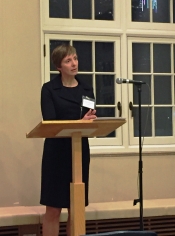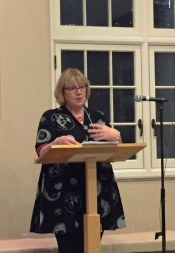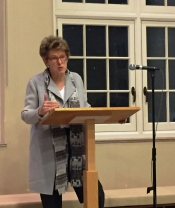By Alexia Loumankis, Bora Laskin Library reference librarian

Alumna Valerie Oosterveld
Alumna Valerie Oosterveld, LLB 1993, the associate dean at the University of Western Ontario’s Faculty of Law, was the guest speaker at the John and Mary Yaremko Forum in Multiculturalism and Human Rights, Nov. 12th, which honoured the 20th anniversary of the Women's Human Rights Resources Programme (WHRR).
The WHRR collects, organizes and disseminates information on women's human rights law to facilitate research, teaching and collaboration. Professor Emerita Rebecca Cook and Ann Rae, former chief librarian of the Bora Laskin Law Library created the website in 1995. It was based on “A Select Bibliography of Women's Human Rights” published in the April 1995 edition of the America University Law Review by Prof. Cook and then-student Valerie Oosterveld.
The forum began with Susan Barker, digital services and reference librarian, Bora Laskin Law Library, and current manager of the website, who has worked with the WHRR site since its inception. Barker outlined the history of the WHRR and thanked its dedicated volunteer contributors over the years: students at the Faculty of Law, as well as alumni and communitymembers. “They help in keeping international women’s human rights front and centre.” She noted also the site’s global reach, with visitors “from 90 countries this year alone.”

Susan Barker
In her introduction, Cook lauded Oosterveld’s work saying her former student is “always pushing herself to make sure that her research is relevant.” Oosterveld’s research focuses on gender issues within international criminal justice. She previously served in the Legal Affairs Bureau of Canada’s Department of Foreign Affairs and International Trade by providing legal advice on international criminal accountability for genocide, crimes against humanity, and war crimes, especially with respect to international criminal courts.
“It’s an honour to come back to the law school and to see 20 years later what the WHRR has become,” said Oosterveld. Her talk, titled Women's Human Rights in International Criminal Tribunals: The Real Story, noted “until the 1990s there was very, very little consideration of the situation of women and girls in armed conflict in international criminal law.” With the creation the international criminal tribunals for the former Yugoslavia and Rwanda, the international community “woke up, realized there was a serious gender aspect to what was going on. This

Prof. Emerita Rebecca Cook
coincided with the creation of the WHRR because at the time there was a burgeoning of writing by academics in analyzing the gender aspects of these two particular tribunals.”
Oosterveld outlined the kinds of sexual and gender-based crimes that are committed during armed conflict, including forced marriage, rape, and sexual slavery, and how proceedings at the international criminal tribunals have uncovered previously misunderstood patterns and motivations for them. “There is a growing acceptance of these crimes as discreet crimes that should and can be prosecuted, and not as unfortunate consequences of conflict.”
While Oosterveld spoke of the difficulties international criminal courts have in prosecuting sexual and gender-based crimes, she also spoke of the strides these courts have taken in recent years. In June 2014, the International Criminal Court (ICC) published its Policy Paper on Sexual and Gender-Based Crimes. This paper has reinforced the ICC’s Office of the Prosecutor’s commitment to integrating a gender perspective and analysis into all of its work, and paying particular attention to sexual and gender-based crimes.
“We’ve learned a great deal about the gendered nature of genocide, crimes against humanity, and war crimes from the work of the various international criminal tribunals over the past two decades,” said Oosterveld, “but there’s so much more left to learn.”



